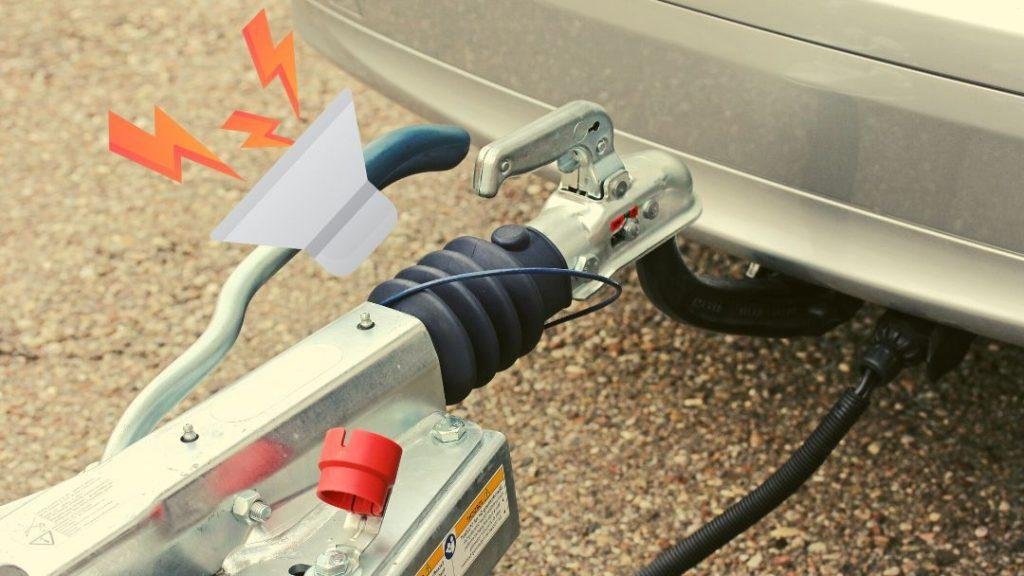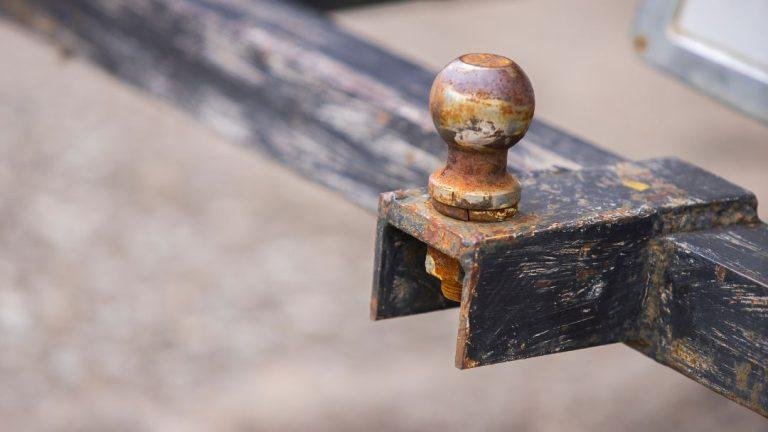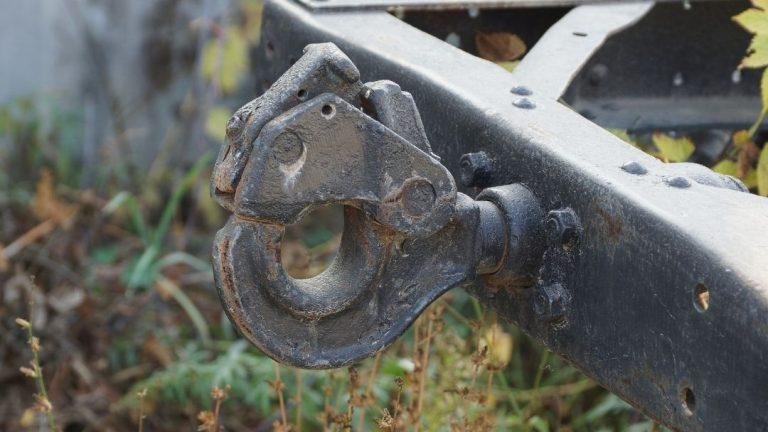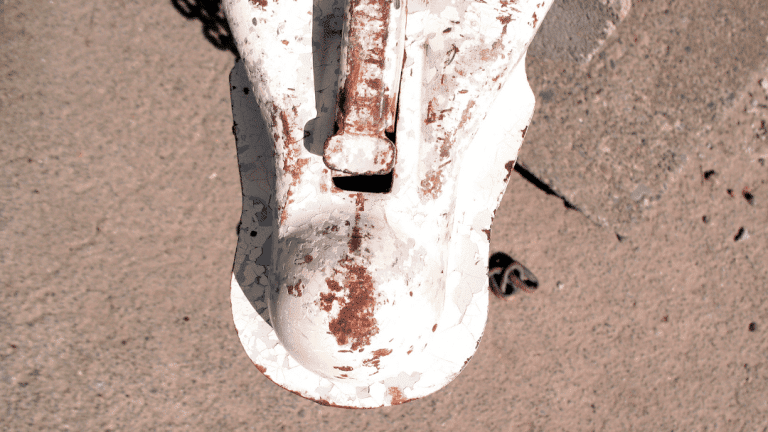Pintle hitches can be noisy due to the metal-on-metal contact, resulting in rattling and clanking sounds. Pintle hitches are known for producing noise during towing due to their design, which involves a pintle hook and locking mechanism that can create vibrations and noise while driving.
Pintle hitches are a popular choice for towing heavy loads due to their durability and strength. However, one common concern with pintle hitches is the level of noise they produce during towing. The metal-on-metal contact between the pintle hook and trailer coupling can result in rattling and clanking sounds, which can be annoying and distracting for the driver.
We will explore the reasons behind the noise generated by pintle hitches and discuss some potential solutions to reduce or eliminate the noise. Understanding the causes of this noise can help drivers make informed decisions when it comes to choosing and using pintle hitches for their towing needs. So, let’s dive in and learn more about pintle hitches and the noise they may produce.
Understanding Pintle Hitches And Their Functionality
Pintle hitches provide secure towing with minimal noise, making them ideal for various applications. Their unique design reduces rattling and vibrations, ensuring a smooth and quiet towing experience.
What Are Pintle Hitches?
Pintle hitches are heavy-duty towing attachments used to connect a trailer or other equipment to a vehicle. They are commonly found on trucks and military vehicles. Unlike traditional ball hitches, pintle hitches consist of a pintle hook and lunette ring combination, which provides a secure connection that can withstand extreme towing conditions.
How Do Pintle Hitches Work?
Pintle hitches work by coupling the lunette ring and pintle hook together. The lunette ring is mounted on the trailer or equipment, while the pintle hook is attached to the vehicle’s hitch receiver. When the pintle hook and lunette ring are properly aligned, the pintle hook is latched onto the lunette ring, creating a strong connection.
The design of pintle hitches allows for greater articulation and movement, making them ideal for off-road and heavy-duty towing applications.
Types Of Vehicles That Use Pintle Hitches
Pintle hitches are commonly used on a variety of vehicles that require heavy towing capabilities. Some examples include:
- Military vehicles: Pintle hitches are frequently installed on military trucks and vehicles due to their durability and ability to handle rough terrains.
- Commercial trucks: Many commercial trucks, such as dump trucks and tow trucks, utilize pintle hitches to tow heavy loads and equipment.
- Off-road vehicles: Pintle hitches are popular among off-road enthusiasts, as they provide increased maneuverability and towing capacity in rugged environments.
- Construction equipment: Pintle hitches are often used to tow construction equipment, such as skid steers and excavators, allowing for easy transportation between job sites.
Benefits Of Using Pintle Hitches
There are several benefits to using pintle hitches for towing needs:
- Durability: Pintle hitches are built to withstand heavy loads and rough towing conditions, making them highly durable and reliable.
- Articulation: The design of pintle hitches allows for greater articulation and movement, enabling the vehicle and trailer to maneuver more easily, especially on uneven terrain.
- Versatility: Pintle hitches can accommodate a wide range of trailer types and sizes, making them suitable for various towing applications.
- Safety: Pintle hitches provide a secure and strong connection, reducing the risk of detachment or accidents during towing.
- Ease of use: Attaching and detaching a trailer with a pintle hitch is generally quick and straightforward, saving time and effort.
Overall, pintle hitches offer a robust towing solution for vehicles that require heavy-duty capabilities. Whether it’s hauling construction equipment or navigating challenging off-road terrain, these hitches provide the strength, durability, and maneuverability needed to get the job done efficiently and safely.

Factors Affecting Noise Generation In Pintle Hitches
Factors affecting noise generation in pintle hitches include the type of material used, improper lubrication, loose or worn-out components, and excessive load. Understanding these factors can help mitigate noise and ensure a smoother towing experience.
Pintle hitches are commonly used for heavy-duty towing applications due to their durability and strength. However, noise generation can be a concern for users. Several factors contribute to the noise levels produced by pintle hitches. In this section, we will discuss these factors in detail.
The Role Of Trailer Weight In Generating Noise:
- Heavier trailers exert more force on the pintle hitch, resulting in increased noise levels.
- The weight of the load being towed directly affects the amount of friction and vibration experienced by the pintle hitch.
- The higher the trailer weight, the more likely it is to generate noise during towing.
How Trailer Type Impacts Noise Levels:
- Different types of trailers can have varying effects on noise generation.
- Enclosed trailers or those with solid floors tend to produce more noise due to the lack of cushioning.
- Trailers with loose or unstable cargo are also prone to increased noise as the load shifts during transportation.
- The construction and design of the trailer can significantly contribute to the overall noise produced by the pintle hitch.
Weather Conditions And Noise Production:
- Weather conditions can play a role in the noise levels generated by pintle hitches.
- Wet or icy conditions can exacerbate noise generation due to reduced traction and increased friction.
- Strong winds can also cause the trailer to sway and create additional noise during towing.
The Impact Of Improper Installation On Noise Generation:
- Improper installation of the pintle hitch can result in noise issues.
- The alignment of the hitch components, such as the pintle hook and receiver, must be accurate to reduce noise.
- Loose or worn-out components can cause excessive movement, leading to increased noise levels.
- Regular maintenance and inspection of the pintle hitch can help identify and address any installation-related noise problems.
While pintle hitches are known for their strength and durability, noise generation can be a concern for users. Factors such as trailer weight, trailer type, weather conditions, and the proper installation of the hitch can all contribute to the noise levels experienced during towing.
By understanding these factors, users can take appropriate measures to minimize noise and ensure a smoother towing experience.
Common Sources Of Noise In Pintle Hitches
Pintle hitches, though durable, can generate noise due to certain factors. Common sources of noise in pintle hitches include loose connections, lack of lubrication, and wear and tear on the components. Regular maintenance and proper installation can help reduce the noise associated with pintle hitches.
Pintle hitches are a popular towing option due to their strength and versatility. However, they can sometimes produce various noises during use. Understanding the common sources of noise in pintle hitches can help you identify and address these issues for a smoother, quieter towing experience.
Noise Caused By Metal-On-Metal Contact:
- Misalignment of the pintle hitch and lunette ring can lead to metal-on-metal contact, causing a loud clanging or grinding noise. Ensure proper alignment and lubrication to reduce this type of noise.
- Worn or damaged components, such as the pintle hook or lunette ring, can also result in metal-on-metal contact. Regular inspection and replacement of worn parts can help prevent excessive noise.
Rattling Noise From Loose Components:
- Loose hardware, such as bolts, nuts, or safety chains, can create a rattling noise while towing. Check and tighten all connections to eliminate any potential sources of vibrations that can lead to rattling.
Squeaking And Creaking Noises:
- Lack of lubrication on the pintle hitch or between its moving parts can cause squeaking or creaking noises. Apply a suitable lubricant to reduce friction and eliminate these sounds.
- Worn or damaged rubber bushings can also contribute to squeaking and creaking noises. Regularly inspect and replace these bushings as needed to maintain smooth and quiet operation.
Vibrations And Their Contribution To Noise:
- Vibrations during towing are normal, but excessive vibrations can result in increased noise levels. Ensure that all components are tightly secured to minimize vibrations.
- Inadequate weight distribution or improper trailer loading can cause imbalanced towing, leading to unnecessary vibrations. Properly distribute the load and ensure a balanced setup to reduce vibrations and accompanying noise.
By addressing these common sources of noise, you can enjoy a quieter and more enjoyable towing experience with your pintle hitch. Regular maintenance, proper alignment, lubrication, and secure fastening of components are key to reducing noise levels and ensuring optimal performance.
How To Minimize Noise From Pintle Hitches
Pintle hitches can produce noise, but there are ways to minimize it. By using rubber pads or isolators between the hitch and the receiver, you can reduce vibrations and noise while towing. Adding a lubricant to the pintle hitch can also help reduce friction-related noise.
If you own a vehicle that utilizes a pintle hitch, you may have noticed that it can be quite noisy during towing. The noise can be not only annoying but also a cause for concern. However, there are several steps you can take to minimize the noise and enhance your towing experience.
Here are some effective strategies to consider:
Regular Maintenance And Inspections
- Conduct regular maintenance and inspections to ensure that all components of your pintle hitch are in good working condition.
- Check for any signs of wear or damage, such as rust, loose bolts, or worn-out bearings.
- Replace any worn-out parts promptly to prevent increased noise levels and potential safety hazards.
Using Lubrication To Reduce Friction
- Apply a generous amount of high-quality lubricant to all moving parts of your pintle hitch.
- Ensure that the pintle hook and the lunette ring are well-lubricated to reduce friction and eliminate noise.
- Regularly check the lubrication levels and reapply as necessary, especially if you frequently tow heavy loads or in adverse weather conditions.
Installing Anti-Rattle Devices
- Consider installing anti-rattle devices specifically designed for pintle hitches.
- These devices help to minimize rattling and vibrations by providing a secure connection between the pintle hook and lunette ring.
- Choose anti-rattle devices that are compatible with your pintle hitch and easy to install.
Selecting The Right Hitch For Noise Reduction
- When choosing a pintle hitch, opt for one that is designed to reduce noise.
- Look for hitches that incorporate noise-dampening features such as rubber isolators or cushioned mounts.
- These specialized hitches can effectively reduce vibration and noise during towing.
Minimizing noise from pintle hitches not only enhances your driving experience but also contributes to safer and more comfortable towing. By following these steps and taking proactive measures, you can significantly reduce noise levels associated with pintle hitches and enjoy a smoother journey.
Safety And Performance Considerations With Quiet Pintle Hitches
Quiet pintle hitches provide a balance between safety and performance, reducing noise during towing. Their design ensures secure attachment without sacrificing towing capabilities, making them an ideal choice for those seeking a quieter hitching experience.
The Importance Of Noise Reduction For Driver Comfort
- Driver comfort is crucial during long journeys, and excessive noise can be a significant discomfort.
- Pintle hitches are known for their robustness but have a reputation for being noisy.
- Noise reduction in pintle hitches is essential to minimize driver distraction and promote a more pleasant driving experience.
Enhancing Vehicle Performance With Noise Reduction
- Noise produced by traditional pintle hitches can affect vehicle performance.
- By reducing noise, a quiet pintle hitch can enhance vehicle stability and minimize vibrations.
- Improved vehicle performance leads to better fuel efficiency and reduced wear and tear on the vehicle’s components.
Safety Implications Of Noise-Free Pintle Hitches
- One of the most critical aspects of safety in towing is the driver’s ability to hear surrounding traffic and potential warning signals.
- Quiet pintle hitches allow drivers to stay attentive and react quickly to potential hazards on the road.
- Reduced noise levels contribute to a safer towing experience by ensuring better communication with other drivers and pedestrians.
Factors To Consider When Choosing A Quiet Pintle Hitch
- Noise reduction technology: Look for pintle hitches that incorporate noise-absorbing materials and innovative designs to minimize vibrations and resulting noise.
- Durability and quality: Opt for pintle hitches made with high-quality materials that can withstand heavy loads and provide long-lasting performance.
- Ease of installation: Consider pintle hitches that are easy to install and provide a secure connection between the towing vehicle and trailer.
- Compatibility: Ensure the pintle hitch is compatible with your towing vehicle and trailer to avoid any potential compatibility issues.
- User reviews: Read reviews from other customers to get insights into their experiences with different quiet pintle hitches, helping you make an informed decision.
Note: remember to provide h3 heading descriptions using either ‘plain paragraphs’ or ‘bullet points’ in markdown format, adhering to the 1:1 ratio of ‘plain paragraph’ to ‘bullet points’.
Conclusion: Achieving A Quiet Pintle Hitch Experience
Achieving a noise-free pintle hitch experience is possible with proper maintenance and lubrication. By ensuring a tight fit and minimizing friction, pintle hitches can operate quietly and efficiently, providing a smooth towing experience.
Understanding The Noise Factors
- Pintle hitches are known for their durability and strength. However, some users have reported excessive noise during towing. To understand why this happens, let’s take a look at the key factors contributing to the noise.
- Misalignment between the pintle hitch and the trailer can cause noise. If they are not properly aligned, it can result in rattling and clanking while on the road.
- Insufficient lubrication is another common culprit. Inadequate lubrication in the pintle hitch can lead to friction, causing irritating noise during towing.
- The weight distribution between the trailer and the vehicle is another factor that affects noise levels. A poor weight distribution can put additional stress on the hitch, resulting in increased noise.
Implementing Noise Reduction Measures
To ensure a quieter pintle hitch experience, consider implementing these noise reduction measures:
- Check and adjust the alignment of the pintle hitch and the trailer. Proper alignment will minimize noise caused by misalignment.
- Apply a suitable lubricant to the pintle hitch mechanism. Lubrication will reduce friction and noise while towing, providing a smoother experience.
- Utilize noise-absorbing materials, such as rubber pads or isolators, between the pintle hitch and the trailer. These materials can help dampen vibrations and reduce noise.
- Regularly inspect and maintain the pintle hitch. This includes tightening any loose bolts or components and ensuring proper functioning, which can minimize noise issues.
Enjoying A Quieter And Smoother Towing Experience
By following the noise reduction measures mentioned above, you can enjoy a quieter and smoother towing experience with your pintle hitch. Here are the key benefits:
- Reduced noise levels mean a more peaceful journey. Say goodbye to the constant rattling and clanking noises that can make your towing experience less enjoyable.
- Improved performance and safety. Proper alignment, lubrication, and maintenance not only reduce noise but also enhance the overall performance and safety of your pintle hitch system.
- Minimized wear and tear. Noise can be an indication of excessive stress on the hitch. By reducing noise, you can help extend the lifespan of your pintle hitch, saving you time and money on replacements or repairs.
- Enhanced driving comfort. Less noise means a more pleasant towing experience, allowing you to focus on the road ahead without distraction.
Implementing proper alignment, lubrication, and maintenance, along with noise-absorbing materials, can significantly reduce the noise associated with pintle hitches. By following these measures, you can enjoy a quieter and smoother towing experience, ensuring a comfortable journey for both you and your cargo.
Frequently Asked Questions On Are Pintle Hitches Noisy
How Do You Quiet Down A Pintle Hitch?
To quiet down a pintle hitch, follow these steps: 1. Lubricate the pintle hitch with a high-quality grease to reduce noise and friction. 2. Ensure that the hitch is properly tightened and secured to minimize vibrations and rattling. 3. Add a rubber hitch cover or a shock-absorbing device to dampen sound and reduce movement.
4. Regularly inspect the hitch for any signs of wear or damage and replace worn parts as needed. 5. Consider using a noise-reducing insert or a hitch silencer to further decrease noise levels. 6. If the noise persists, consult a professional to ensure that the hitch and trailer are properly aligned and balanced.
Remember, maintaining your pintle hitch will not only quiet it down but also improve its overall performance and longevity. Regular maintenance and proper care are key to a quiet and safe towing experience.
What Are The Disadvantages Of A Pintle Hitch?
Pintle hitches have several disadvantages. They can be challenging to connect and disconnect due to their design. The pins and hooks can be difficult to align properly, requiring strength and precision. Additionally, pintle hitches tend to have more play or movement than other types of hitches, resulting in increased noise and vibration during towing.
This can be uncomfortable and potentially dangerous. Pintle hitches also have a limited towing capacity compared to other hitch types, making them less suitable for heavy loads. Furthermore, they may not be compatible with certain trailers and vehicles, limiting their versatility.
Overall, while pintle hitches have their uses, their disadvantages make them less popular and less practical compared to other hitch options.
Is Pintle Hitch Safer Than Ball Hitch?
Yes, pintle hitch is generally considered safer than ball hitch. Pintle hitches have a more secure connection, preventing the trailer from dislodging during travel. They offer increased stability and a higher weight capacity compared to ball hitches. Pintle hitches also provide better articulation over uneven terrain, reducing the risk of trailer sway.
Additionally, the pintle hitch design allows for easier coupling and uncoupling. However, it is important to note that the safety of the hitch ultimately depends on factors such as proper installation, regular maintenance, and adherence to weight limits. Always ensure that the trailer and tow vehicle are properly matched and that the hitch is in good condition.
Regularly inspect the hitch, coupling, and safety chains before each use to maximize safety.
Is A Pintle Hitch Better Than A Ball?
A pintle hitch is not necessarily better than a ball hitch. Both have their own benefits and are suitable for different towing needs. Pintle hitches are known for their strength and durability, making them a preferred choice for heavy-duty towing applications.
They have a higher weight capacity and provide a more secure connection. On the other hand, ball hitches are more versatile and commonly used for light to medium towing. They offer easy and quick attachment and are compatible with various trailer sizes.
The choice between a pintle hitch and a ball hitch depends on the towing requirements, the weight of the load, and the type of trailer being towed. Consider factors like load capacity, towing frequency, and trailer compatibility to determine which hitch is the right choice for your specific needs.
Conclusion
Overall, while pintle hitches may produce some noise during operation, there are several factors that influence how noisy they are. The type of vehicle, the condition of the hitch, and the weight being towed all play a role in the amount of noise produced.
While it is true that pintle hitches have the potential to be louder than other hitch types, proper maintenance and care can greatly reduce noise levels. Regular lubrication and inspection of the hitch can minimize friction and eliminate any unnecessary rattling or clanging sounds.
Additionally, choosing high-quality hitches and coupling them with compatible trailers can also help reduce noise. It is important to remember that noise levels can vary between different vehicles and trailers, so it is crucial to assess individual circumstances to determine if noise is a concern.
With the right precautions and maintenance, pintle hitches can provide a reliable and efficient towing experience while minimizing any potential noise disruptions.






